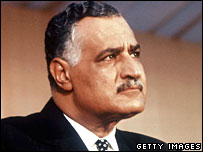How Suez made Nasser an Arab icon
By Roger Hardy
BBC News Middle East analyst
When he nationalised the Suez Canal Company on 26 July 1956, Egypt's President Gamal Abdel Nasser became the hero of
the Arab world.
He was one of the army officers who had taken part in the coup which overthrew the country's British-backed monarchy in
1952.
The Arab response to the new military regime, writes historian Rashid Khalidi, was at first lukewarm.
"Suez changed this, firmly establishing Nasser as the pre-eminent Arab leader until the end of his life, and Arab nationalism
as the leading Arab ideology."
Taking control of the canal was an act of national self-assertion - and defiance of Britain - which electrified Arabs
everywhere.
Nasser was seen as a new breed of ruler ready to stand up to the old colonial order.
By the time the Suez Crisis had run its course - and Britain and France had been forced to make a humiliating withdrawal
from Egyptian territory - his regional position had become unassailable.
The dream of Arabism
Arab nationalism, or "Arabism", embodied the idea that all Arabs from Morocco to the Gulf should unite in a single state.
It was an illusion, but a potent one.
NASSER'S LIFE

Born in 1918, the son of a postal clerk
Graduate of military academy, promoted to colonel in 1950
Led the Free Officers in 1952 in a coup that seized power by toppling the British-backed monarchy
Elected president in 1956 and nationalised the Suez Canal shortly after
Resigned after Arab defeats of 1967, but popular demonstrations brought him back to power
Died of a heart attack in 1970
During the heyday of Nasser's influence in the 1950s and 1960s, the idea that the Arabs should join together under Egyptian
leadership became very popular.
Using the new medium of the transistor radio, Nasser spread the Arabist message into the most remote corners of the region.
Leaders tainted by their association with the former colonial powers found themselves seriously undermined.
Two years after the Suez affair, the British-backed Iraqi monarchy was overthrown in a bloody coup.
This sent a strong signal that Arab nationalists were now in the driving seat.
The young King Hussein of Jordan, derided by nationalists as a puppet of the British, survived on his throne - but only by the
skin of his teeth.
The Israel issue

With Nasser's ascendancy, three ideas came to dominate Arab politics: Arabism, social justice and the struggle against
Israel.
By allying itself with Britain and France in the Suez affair, Israel confirmed the Arabs in their view that it was the creation
of colonialism.
The struggle against Israel became the predominant Arab cause, but it also in the end contributed to Nasser's undoing.
Some analysts think his success in 1956 led him to overplay his hand in the June War of 1967.
The Egyptian leader thought the big powers would come to his rescue, as the US had done in 1956.
Instead, Israel defeated the Arab armies in a mere six days.
Worn out from a succession of regional crises, Nasser died of a heart attack in 1970.
For many Arabs, the light of Arabism had been extinguished.
Story from BBC NEWS:
http://news.bbc.co.uk/go/pr/fr/-/2/hi/middle_east/5204490.stm
Published: 2006/07/21 17:36:40 GMT
© BBC MMVI